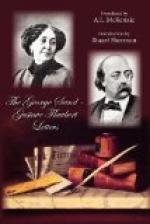I have neither the time to go there, nor the wish to leave like that at a moment’s notice, but I should have liked to send some of my friends there, and he does not offer me a single seat for them. I am writing him a letter that he will receive tomorrow, and I am asking him to send you at least one orchestra seat. If you do not get it, please understand that it was not my fault. I shall have to say the same thing to five or six other people.
I embrace you therefore in a hurry, so as not to lose the post.
Give me news of your niece and embrace her for me.
G. Sand
CCCIV. TO GUSTAVE FLAUBERT, at Paris Nohant, 8th March, 1876
You scorn Sedaine, you great profane soul! That is where the doctrine of form destroys your eye! Sedaine is not a writer, that is true, although he falls but little short of it, but he is a man, with a heart and soul, with the sense of moral truth, the direct insight into human feelings. I don’t mind his out-of-date reasonings and dry phraseology! The right thought is always there, and it penetrates you deeply!
My dear old Sedaine! He is one of my well-beloved papas, and I consider le Philosophe sans le savior far superior to Victorine; it is such a distressing drama and so well carried out! But you only look for the well-turned phrase, that is one thing—only one thing, it is not all of art, it is not even half of it, it is a quarter at most, and if three-quarters are beautiful, one overlooks the part that is not.
I hope that you will not go to seek for your country-side before the good weather; here, we have been pretty well spared; but for the past three days there has been a deluge, and it makes me ill. I should not have been able to go to Paris. Your niece is better, God be praised! I love you and I embrace you with all my soul.
G. Sand
Do tell M. Zola to send me his book. I shall certainly read it with great interest.
CCCV. TO GEORGE SAND Wednesday, 9th March, 1876
Complete success, dear master. The actors were recalled after each act, and warmly applauded. The public was pleased and from time to time cries of approval were heard. All your friends who had come at your summons were sorry that you were not there.
The roles of Antoine and Victorine were especially well played. Little Baretta is a real treasure.
How were you able to make Victorine from le Philosophe sans le savoir? That is beyond me. Your play charmed me and made me weep like an idiot, while the other bored me to death, absolutely bored me to death; I longed to get to the end. What language! the good Tourgueneff and Madame Viardot made saucer-eyes, comical to behold. In your work, what produced the greatest effect is the scene in the last act between Antoine and his daughter. Maubant is too majestic, and the actor who plays Fulgence is inadequate. But everything went very well, and this revival will have a long life.




